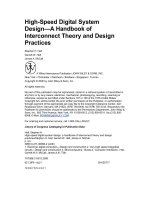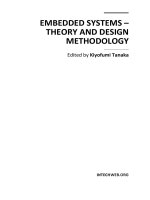Organization theory and design: Lecture 19
Bạn đang xem bản rút gọn của tài liệu. Xem và tải ngay bản đầy đủ của tài liệu tại đây (20.82 KB, 7 trang )
19
Knowledge Management
1
Knowledge Management – Some
Facts
• Knowledge Management is an area concerned with the
efforts to manage and leverage organizational
knowledge
• Traditional organizational resources are capital, labor or
natural resources
• Today it is knowledge
• Particularly for those companies which are striving to
become Learning Organizations.
• Knowledge Management is a new way to think about
organizing and sharing an organization’s intellectual and
creative resources
• A company’s intellectual capital is the sum of its
information, experience, understanding, relationships,
processes, innovations and discoveries
2
What is Knowledge?
•
•
Knowledge is different from data and information
Data are simple, absolute facts and figures that, in and of
themselves, may be of little use. E.g. 30% products of a company
are sold to people in Lahore
• Information is data that have been linked with other data and
converted into a useful context for further use, e.g. in the above
example add that 60% of Lahori people buying that product are over
the age of 60.
• Knowledge goes a step further, it is a conclusion drawn from the
information after it is linked to other information and compared to
what is already known. Knowledge always has a human factor (as
opposed to data and information). It’s always used by a human
being, e.g. a book read by someone and then used in real life
• Knowledge is something stored collectively in the minds of
employees and not data alone stored in some database
3
Types of Knowledge
1. Explicit Knowledge
2. Tacit or Implicit knowledge
4
Types of Knowledge
•
•
Differences between Explicit and Tacit
Knowledge
Learning methodologies of Explicit and
Tacit Knowledge
5
Explicit Knowledge Management
Mechanisms
1. Datawarhousing and data mining
2. Electronic libraries
6
Implicit Knowledge Management
Mechanisms
1. Dialogue
2. Sharing histories and storytelling
3. Communities of practice
•
people who are informally bound with each
other through exposure to a similar set of
problems and a common pursuit of
solutions.
7









